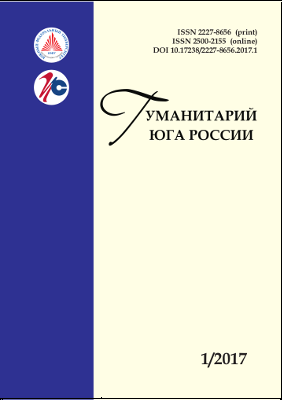Антропоконтуры власти в концепциях А. Кожева и М. Вебера: опыт сравнительного анализа
Для цитирования
Черных С. С., Швачкина Л. А. Антропоконтуры власти в концепциях А. Кожева и М. Вебера: опыт сравнительного анализа // Гуманитарий Юга России. 2017. Том 23. № 1. С. 166-174.
Аннотация
Статья посвящена сравнительному анализу антропоконтуров власти в концепциях А. Кожева и М. Вебера, в котором акцентируется внимание как на типологических сходствах, так и на отличиях сопоставляемых теорий. Изучаются антропоконтуры власти, интерпретируемые сквозь призму организации легитимного порядка. Отмечается, что обе концепции включают в себя темпоральный анализ власти. Вместе с тем концепция А. Кожева носит метафизический характер, тогда как предпосылки рассуждений М. Вебера содержат в себе явную антиметафизическую установку. Демонстрируются отличия в понимании обоими мыслителями рациональности, связанные с различными трактовками взаимодействия воли и разума в человеческой практике.
Ключевые слова:
антропоконтуры власти, власть как авторитет и господство, легитимность, харизма, рациональность, метафизика власти, темпоральный анализ власти
Литература
Аристотель. Метафизика. М., 2006. 608 с.
Вебер М. Избранное: Протестантская этика и дух капитализма. М.; СПб. 2014. 656 с.
Гайденко П.П. Научная рациональность и философский разум. М., 2003. 528 с.
Гегель Г.В.Ф. Феноменология духа. Философия истории. М., 2003. 880 с.
Йоас Х. Креативность действия. СПб., 2005. 320 с.
Кожев А. Атеизм и другие работы. М., 2006. 512 с.
Кожев А. Понятие власти. М., 2007. 192 с.
Ледяев В.Г. Власть: концептуальный анализ. М., 2001. 384 с.
Ницше Ф. По ту сторону добра и зла : соч. М., 2003. 848 с.
Рикёр П. Путь признания. М., 2010. 268 с.
Сапронов П.А. Власть как метафизическая и историческая реальность. СПб., 2001. 816 с.
Черных С.С. Архетипические формы проявления власти в антропологической перспективе // Известия вузов. Северо-Кавказский регион. Общественные науки. 2014. № 5. С. 16–21.
Черных С.С. Метафизическое понимание власти и формы её легитимации в антропологической перспективе // Известия вузов. Северо-Кавказский регион. Общественные науки. 2015. № 2. С. 14–17.
Honneth A. Disrespect. The Normative Foundations of Critical Theory. Cambridge, 2007. 275 p.
Honneth A. The Struggle of Recognition: The Moral Grammar of Social Conflicts. Cambridge, 1995. 215 p.
Вебер М. Избранное: Протестантская этика и дух капитализма. М.; СПб. 2014. 656 с.
Гайденко П.П. Научная рациональность и философский разум. М., 2003. 528 с.
Гегель Г.В.Ф. Феноменология духа. Философия истории. М., 2003. 880 с.
Йоас Х. Креативность действия. СПб., 2005. 320 с.
Кожев А. Атеизм и другие работы. М., 2006. 512 с.
Кожев А. Понятие власти. М., 2007. 192 с.
Ледяев В.Г. Власть: концептуальный анализ. М., 2001. 384 с.
Ницше Ф. По ту сторону добра и зла : соч. М., 2003. 848 с.
Рикёр П. Путь признания. М., 2010. 268 с.
Сапронов П.А. Власть как метафизическая и историческая реальность. СПб., 2001. 816 с.
Черных С.С. Архетипические формы проявления власти в антропологической перспективе // Известия вузов. Северо-Кавказский регион. Общественные науки. 2014. № 5. С. 16–21.
Черных С.С. Метафизическое понимание власти и формы её легитимации в антропологической перспективе // Известия вузов. Северо-Кавказский регион. Общественные науки. 2015. № 2. С. 14–17.
Honneth A. Disrespect. The Normative Foundations of Critical Theory. Cambridge, 2007. 275 p.
Honneth A. The Struggle of Recognition: The Moral Grammar of Social Conflicts. Cambridge, 1995. 215 p.
Форматы цитирования
Другие форматы цитирования:
APA
Черных, С. С., & Швачкина, Л. А. (2017). Антропоконтуры власти в концепциях А. Кожева и М. Вебера: опыт сравнительного анализа. Гуманитарий Юга России, 23(1), 166-174. извлечено от https://www.jour.fnisc.ru/index.php/hsr/article/view/4976
Раздел
ФИЛОСОФИЯ И ОБЩЕСТВО






